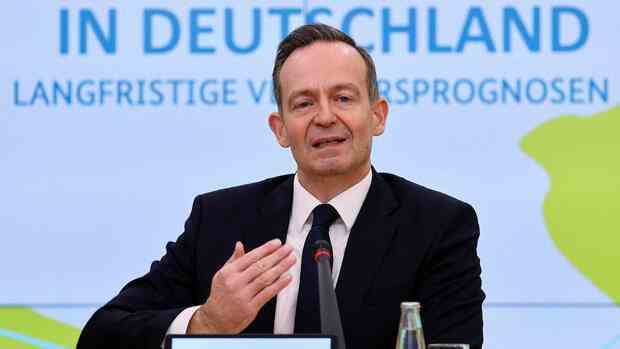For months, the FDP man has been exchanging blows with the Greens on the question of how Germany should be mobile in the future without emitting carbon dioxide.
(Photo: Reuters)
Berlin For Volker Wissing it’s just “climate blah blah” when his coalition partner, the Greens, calls for more climate protection and less traffic. Statements by Dirk Messner, head of the Federal Environment Agency (UBA), leave the Federal Minister of Transport cold. Messner says the road network is “broadly adequate.” But Wissing wants to expand it.
For months, the FDP and the Greens have been exchanging blows on the question of how we want to be mobile in the future without emitting carbon dioxide. This Wednesday, Messner will further fuel the debate by presenting the greenhouse gas balance for 2022. As in 2021, Germans are likely to have emitted more CO2 on the road than they are allowed to do under the Climate Protection Act.
According to the spirit of the law, the transport minister must present an emergency program within four months. The measures contained therein must take effect so quickly that only as much is emitted on roads, rails, waterways and in the air as permitted. At best, this can be achieved with less traffic, i.e. with prohibitions such as a speed limit. But the minister will wave his hand again, as he did last year.
Car traffic will continue to grow and emissions will increase
At that time, Wissing instead suggested expanding cycle paths and charging stations and promoting local transport with the nine-euro ticket. “With our package of measures presented today, we will completely compensate for the difference and lead the transport sector back to the path of meeting the climate targets,” he promised.
This time he has prepared new arguments: a long-term traffic forecast. “I base my transport policy on the actual events, on numbers, data and facts and not on political wishful thinking,” explains the minister.
>> Also read here: Wissing forges an alliance against the planned end of combustion engines in 2035
The figures show that traffic will increase over the next 20 years – especially on the road. The truck will remain the most important means of transport and will even gain market share. Only in passenger transport does the railway gain shares. However, cars and motorcycles remain the means of choice for more than two-thirds of journeys.
In addition, the data hide assumptions that the minister flatly rejects: a sales freeze for new cars with combustion engines from 2035, a speed limit of 30 in cities, significantly fewer parking spaces and at the same time higher parking fees.
The experts even assume a car toll of five cents per kilometer. The explosive thing: The premises have been agreed with the ministry – and according to the expert, they work.
According to this, motorized private transport would “partly experience a dampening” and people would use buses and trains more if driving a car became too expensive or the search for a parking space too tedious. In other words, without the measures, traffic would increase even more.
Ministry: “Currently no plans” for a car toll
The ministry does not deny the effect. However, the assumptions are “not a predetermination for later political decisions,” said a spokesman when asked. And the ministry explains the car toll by saying that the assumed CO2 price for petrol and diesel at 100 euros per tonne of CO2 was set too low. The toll results in “the correct cost level in car traffic”. However, there is “currently no planning” for a toll.
When parking fees rise, the incentive to switch to public transport increases.
(Photo: imago/Jürgen Ritter)
The experts write, however, that in view of the transport and climate targets, they have “assumed ambitious but overall realistic developments up to 2040 that are based on foreseeable planning and needs”. In a recently published position paper, Wissing’s expert advisory board “Climate Protection in Mobility” also calls for a “political mix of pricing, funding and regulatory law”. Just relying on cars and trucks no longer running on petrol and diesel, but only on electricity, is not enough.
On one point, however, the experts agree with the minister: a general speed limit on motorways does not do much for climate protection. There had recently been a heated argument between the Federal Environment Agency and the FDP parliamentary group in the Bundestag on the issue. After the UBA had declared in an expert opinion that a speed limit would do up to three times more for the climate than previously assumed, the FDP commissioned a counter-expert opinion. The result: even the previous assumptions are too optimistic. The measure does not help.
Wissing’s spokesman explained that the minister would continue to rely on “self-determined mobility of people”. Therefore, the expansion of the infrastructure is more urgent than ever. In view of the increasing traffic, “we now need the planning acceleration for all modes of transport – rail, road and waterways”.
More: Wissing’s ministry drops Scheuer’s research center
